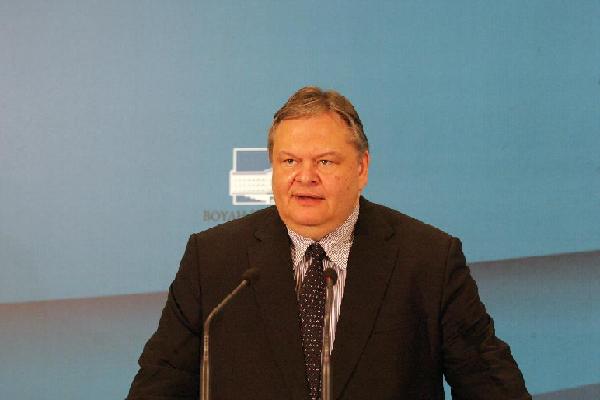Greek coalition gov't talks collapse
 0 Comment(s)
0 Comment(s) Print
Print E-mail Xinhua, May 12, 2012
E-mail Xinhua, May 12, 2012
|
|
|
Evangelos Venizelos, president of the pro IMF-EU memorandum party PASOK, makes a televised address at his parliamentary office, in central Athens, May 11, 2012. Marathon talks among parliamentary parties in debt-ridden Greece for the formation of a coalition government after the May 6 general polls collapsed on Friday, with the prospect of fresh elections in June seeming more likely, Greek media reported. [Xinhua/Marios Lolos] |
Marathon talks among parliamentary parties in debt-ridden Greece for the formation of a coalition government after the May 6 general polls collapsed on Friday, with the prospect of fresh elections in June seeming more likely, Greek media reported.
Socialist PASOK party chief Evangelos Venizelos, who was heading since Thursday the last round of talks according to the Greek Constitution, said that he will visit President Karolos Papoulias on Saturday to hand back the exploratory mandate.
Venizelos, the third Greek party leader who tried and failed to form a coalition government in a week, made the statement following a meeting with Radical Left Coalition SYRIZA leader Alexis Tsipras who rejected a pro-austerity proposal.
Venizelos called "each party to assume its responsibilities" as Papoulias is expected to summon all party leaders in a final attempt to reach consensus and form a coalition on Sunday or Monday.
However, local political analysts expressed doubt over the outcome, insisting that the country is most probably heading to repeat elections on June 10 or June 17.
An opinion poll presented on Greek ANT1 private television channel on Friday evening showed SYRIZA winning 25.5 percent of votes in the new election, with the conservatives of New Democracy (ND), the frontrunners in Sunday's elections, following with 21.5 percent up from 18.9 percent.
In another survey released earlier, SYRIZA was projected to win 27.7 percent of votes and 128 seats in the new 300-member parliament, if elections were held this weekend, with ND garnering 20.3 percent and PASOK 12.6 percent.
With no party securing a clear parliamentary majority again after the new elections, according to pollsters, anxiety rises whether Greece will be able to swiftly form a stable coalition government to lead the country avert an exit of the euro zone.
German Foreign Minister Guido Westerwelle on Friday warned Greece that if Athens strayed from agreed austerity and reform measures, further international rescue funds would not be forthcoming and that the eurozone is better prepared for a Greece exit.
Later in the day, German Finance Minister Wolfgang Schaeuble, another heavyweights in Chancellor Angela Merkel's cabinet, hinted in an interview that great market shocks, like Greece's exit, is something the eurozone could survive.
Meanwhile, European Council President Herman Van Rompuy urged Greek politicians must stand by their European Union (EU) engagements and bring heavily-indebted Greece back on track.






